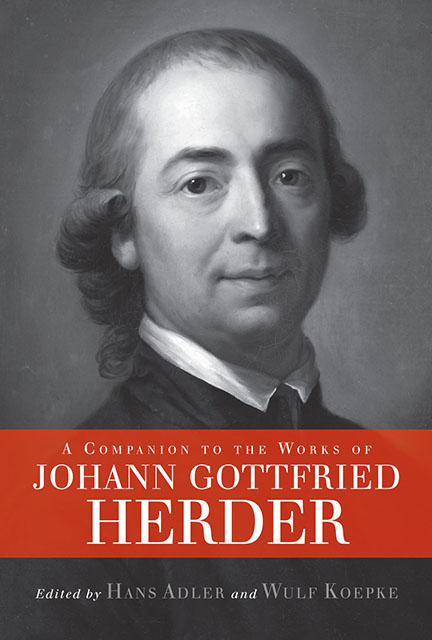Book contents
- Frontmatter
- Contents
- Acknowledgments
- List of Abbreviations
- Introduction
- 1 Herder's Life and Works
- 2 Herder's Epistemology
- 3 Herder and Historical Metanarrative: What's Philosophical about History?
- 4 Herder's Concept of Humanität
- 5 Herder and Language
- 6 Herder's Aesthetics and Poetics
- 7 Myth, Mythology, New Mythology
- 8 Particular Universals: Herder on National Literature, Popular Literature, and World Literature
- 9 Herder's Views on the Germans and Their Future Literature
- 10 Herder's Biblical Studies
- 11 Herder's Theology
- 12 Herder and Politics
- 13 Herder's Poetic Works, His Translations, and His Views on Poetry
- 14 Herder's Style
- 15 Herder as Critical Contemporary
- 16 Herder in Office: His Duties as Superintendent of Schools
- 17 Herder's Reception and Influence
- Bibliography
- Notes on the Contributors
- Index
2 - Herder's Epistemology
Published online by Cambridge University Press: 28 February 2023
- Frontmatter
- Contents
- Acknowledgments
- List of Abbreviations
- Introduction
- 1 Herder's Life and Works
- 2 Herder's Epistemology
- 3 Herder and Historical Metanarrative: What's Philosophical about History?
- 4 Herder's Concept of Humanität
- 5 Herder and Language
- 6 Herder's Aesthetics and Poetics
- 7 Myth, Mythology, New Mythology
- 8 Particular Universals: Herder on National Literature, Popular Literature, and World Literature
- 9 Herder's Views on the Germans and Their Future Literature
- 10 Herder's Biblical Studies
- 11 Herder's Theology
- 12 Herder and Politics
- 13 Herder's Poetic Works, His Translations, and His Views on Poetry
- 14 Herder's Style
- 15 Herder as Critical Contemporary
- 16 Herder in Office: His Duties as Superintendent of Schools
- 17 Herder's Reception and Influence
- Bibliography
- Notes on the Contributors
- Index
Summary
I.
IN 1763, HERDER ATTENDED Immanuel Kant's lectures on metaphysics, which consisted of a critical commentary on Alexander Gottlieb Baumgarten’s Metaphysica. Baumgarten's book represented the most advanced position of rationalistic gnoseology, where the marginal area of “confused cognition” is circumscribed as an independent complex that was later developed by Baumgarten in his Aesthetica into a systematic complement of distinct cognition. Kant's lectures inspired Herder to write his first philosophical text, Versuch über das Sein (Essay on Being, 1763), dedicated to Kant. This essay, a critical discussion of the then-current theories of ontology and epistemology, an analysis from which Herder developed the nucleus of his own approach, was not published during Herder's lifetime. But since the Versuch über das Sein is foundational for Herder's thought in this area, and since essential elements of it — especially the doctrines of being and of space, time, and force as the basic concepts of human cognition — remain constant throughout the metamorphoses of his epistemological conception, it is important to trace the essay's lines of argumentation.
Herder clears the path to a foundation of his own position by delineating critical boundaries with respect to empiricism, on the one hand, and idealism on the other. Herder agrees with Hume's insight that empiricism fails in the attempt to prove its own foundations. However, while it is impossible to demonstrate that perceptions are caused by external objects resembling them, this does not justify the opposing idealistic view. That view posits that the representations of the “inner sense” originate in the ego itself. It is true that the idea of a knowing subject that possesses a creative inner sense such that all its contents are emphatically its own representations, produced by itself, is by no means absurd; for this reason, idealism cannot be theoretically refuted. But the human being is not God, that is, he does not possess a creative inner sense or — as Herder also calls it — a consciousness that creates out of itself. Human beings need to become conscious of representations, a process realized through reflection and abstraction, which has as its basis the presence of representations to an external sense. For Herder, human beings are hybrid beings: in contrast to animals, they possess not only external senses, but also an inner sense, so that they are able to speak of the representations they possess as their own.
- Type
- Chapter
- Information
- A Companion to the Works of Johann Gottfried Herder , pp. 43 - 64Publisher: Boydell & BrewerPrint publication year: 2009
- 19
- Cited by



